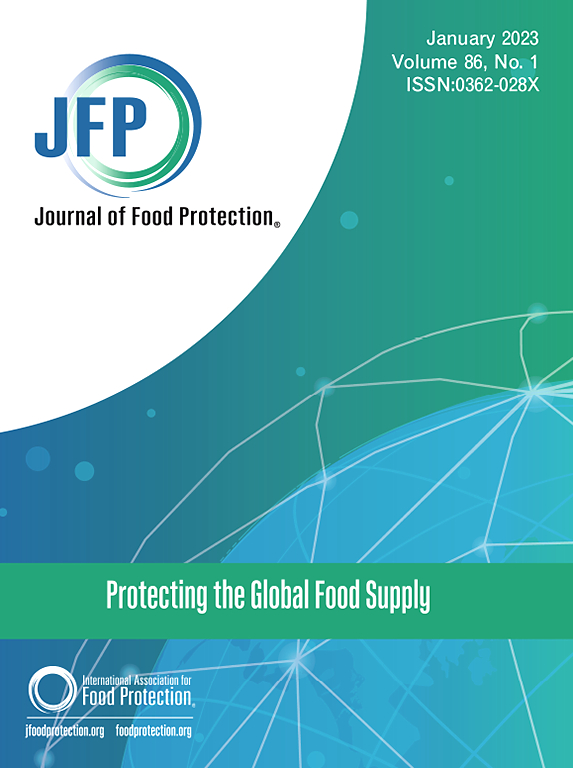建立一种实时荧光RNA定向等温扩增检测方法,快速鉴定婴儿配方奶粉中的克罗诺杆菌种类。
IF 2.8
4区 农林科学
Q3 BIOTECHNOLOGY & APPLIED MICROBIOLOGY
引用次数: 0
摘要
克罗诺杆菌等食源性细菌是机会性的,与潜在的致命感染有关。本工作建立了一种快速灵敏的克罗诺杆菌RNA靶向扩增检测系统,包括富集、RNA分离和实时RNA等温扩增检测,能够检测婴儿配方奶粉(PIF)和其他食品中的克罗诺杆菌活菌。提取总RNA,优化同步扩增和测试(SAT)反应条件,包括引物、分子信标、Mg2+、dNTP和NTP的浓度。优化后的SAT检测方法靶向16s/23s rRNA,验证了检测方法的特异性和敏感性。对7株阪崎克罗诺杆菌和24株对照菌株进行实时荧光定量PCR (SN/T 1632.3)和ISO 22964检测。SAT检测灵敏度为2 log10 CFU/ml,富集4小时检测限为2 log CFU/10ml,富集7小时检测限为2 log CFU/1000ml (real-time PCR未富集灵敏度为3 log CFU/ml,富集4小时检测限为log CFU/ml,富集8小时检测限为2 log CFU/10ml)。与隔夜富集的实时PCR法相比,这一过程明显缩短。此外,SAT法在检测死亡坂崎梭菌(7-2 log CFU/ml)时没有假阳性结果。相比之下,实时PCR检测的检测限与检测活菌的检测限相当。该方法具有快速、灵敏和简便的特点,在婴儿配方奶粉和其他食品中检测克罗诺杆菌具有很大的潜力。本文章由计算机程序翻译,如有差异,请以英文原文为准。
Development of a Test for the Real-time Fluorescence RNA Targeted Isothermal Amplification to Quickly Identify Cronobacter Species in Powdered Infant Formula
Foodborne bacteria such as Cronobacter are opportunistic and have been connected to potentially fatal infections. The current work created a fast and sensitive RNA targeting amplification and detection system for Cronobacter spp., including enrichment, RNA isolation, and detection by real-time RNA isothermal amplification, capable of detecting viable Cronobacter spp. in powdered infant formula (PIF) and other food products. Total RNA was extracted to optimize Simultaneous Amplification and Testing (SAT) reaction conditions including concentrations of primers, molecular beacon, Mg2+, dNTP, and NTP. The optimized SAT assay targeting 16s/23s rRNA was used to demonstrate the specificity, sensitivity of the detection assay. Seven Cronobacter sakazakii strains and 24 control strains were examined in comparison to that of real-time PCR (SN/T 1632.3) and ISO 22964. The SAT assay showed sensitivity with a detection limit of 2 log10 CFU/ml without preenrichment, 2 log CFU/10 ml with 4 h enrichment, and 2 log CFU/1,000 ml with 7 h preenrichment (The sensitivity of real-time PCR are 3 log CFU/ml without preenrichment, log CFU/ml with 4 h preenrichment, and 2 log CFU/10 ml with 8 h preenrichment) The newly developed assay could provide results in 4 h including enrichment, which has been significantly shortened compare with real−time PCR method with overnight enrichment. Moreover, the SAT assay did not give false positive results when detecting dead C. sakazakii (7-2 log CFU/ml). In contrast, the real-time PCR assay exhibited a detection limit equivalent to that for detecting viable bacteria. The developed SAT assay, combined with enrichment, provides a rapid, sensitive, and simple approach, and has great potential in the detection of Cronobacter species in baby formula and other food goods.
求助全文
通过发布文献求助,成功后即可免费获取论文全文。
去求助
来源期刊

Journal of food protection
工程技术-生物工程与应用微生物
CiteScore
4.20
自引率
5.00%
发文量
296
审稿时长
2.5 months
期刊介绍:
The Journal of Food Protection® (JFP) is an international, monthly scientific journal in the English language published by the International Association for Food Protection (IAFP). JFP publishes research and review articles on all aspects of food protection and safety. Major emphases of JFP are placed on studies dealing with:
Tracking, detecting (including traditional, molecular, and real-time), inactivating, and controlling food-related hazards, including microorganisms (including antibiotic resistance), microbial (mycotoxins, seafood toxins) and non-microbial toxins (heavy metals, pesticides, veterinary drug residues, migrants from food packaging, and processing contaminants), allergens and pests (insects, rodents) in human food, pet food and animal feed throughout the food chain;
Microbiological food quality and traditional/novel methods to assay microbiological food quality;
Prevention of food-related hazards and food spoilage through food preservatives and thermal/non-thermal processes, including process validation;
Food fermentations and food-related probiotics;
Safe food handling practices during pre-harvest, harvest, post-harvest, distribution and consumption, including food safety education for retailers, foodservice, and consumers;
Risk assessments for food-related hazards;
Economic impact of food-related hazards, foodborne illness, food loss, food spoilage, and adulterated foods;
Food fraud, food authentication, food defense, and foodborne disease outbreak investigations.
 求助内容:
求助内容: 应助结果提醒方式:
应助结果提醒方式:


